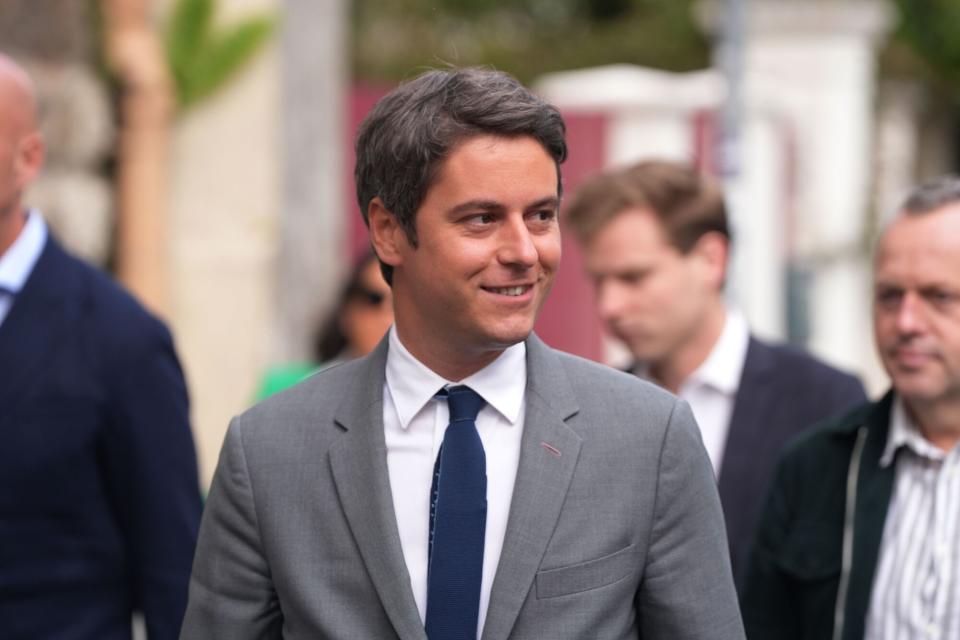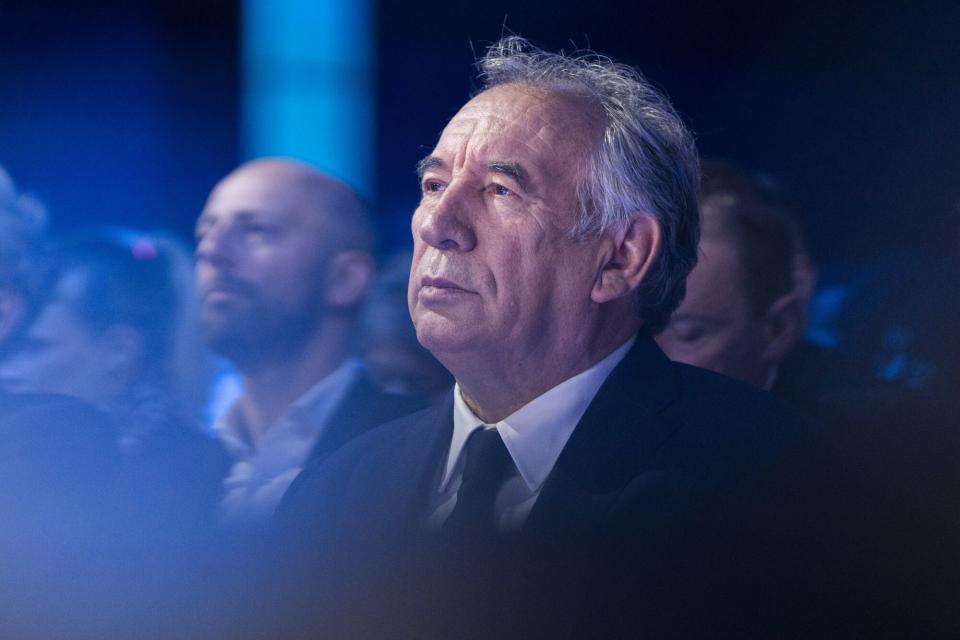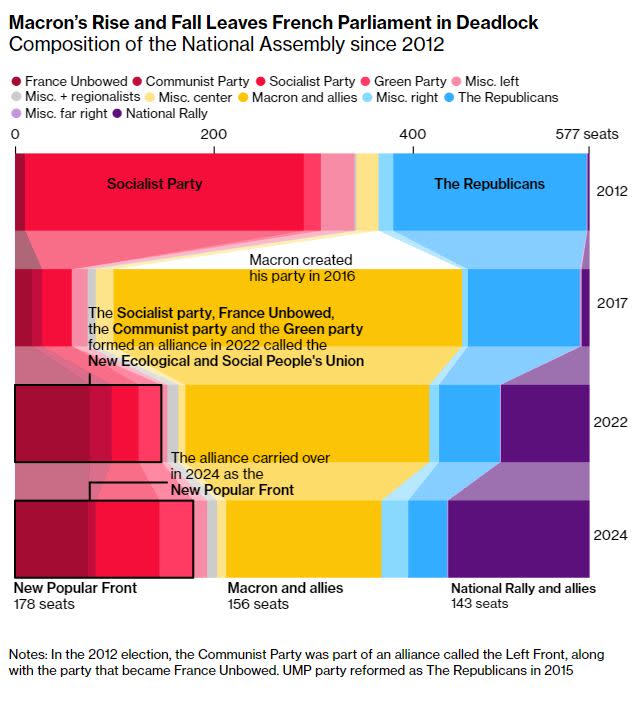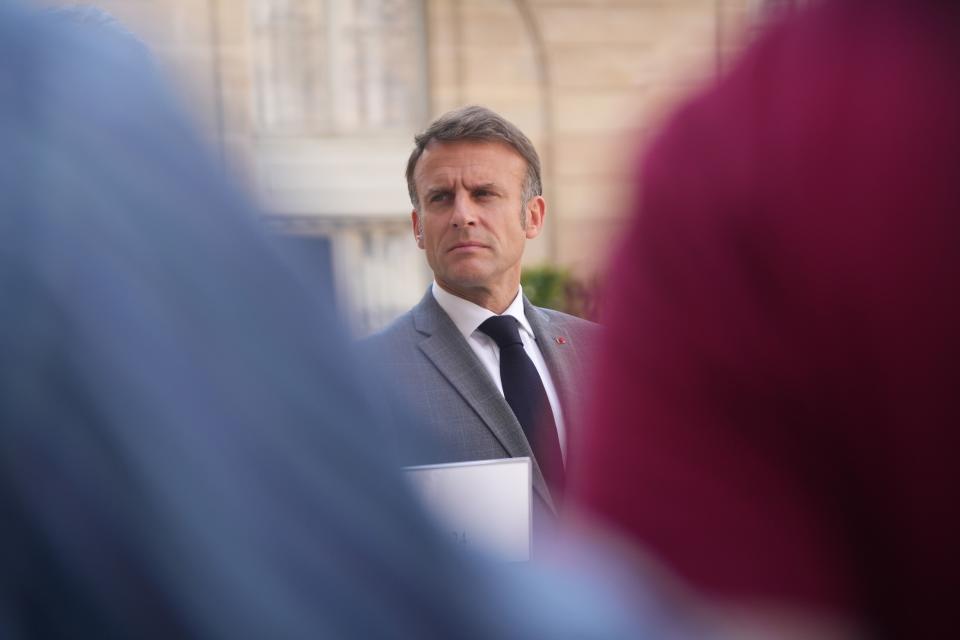The Potential Contenders to Become France’s New Prime Minister
(Bloomberg) -- President Emmanuel Macron plunged France into political disarray with snap elections and now faces the nearly intractable decision of finding a prime minister capable of charting a path forward.
Most Read from Bloomberg
Saudis Warned G-7 Over Russia Seizures With Debt Sale Threat
Microsoft Orders China Staff to Use iPhones for Work and Drop Android
S&P 500 Holds Gains as Fed Bets Steady on Powell: Markets Wrap
While Macron’s centrists ended up in second place, his power base has shrunk further and is hemmed in by Marine Le Pen’s far-right National Rally and a left-wing alliance, known as the New Popular Front.
The resurgent French left, which emerged as the surprise winner on Sunday, is pushing to field a candidate. The problem is they’re more than 100 seats short of a majority on their own. Although a combination with Macron’s allies could provide enough backing, divisions are bitter and deep.
A deal with the traditional Republican conservatives is also in play, along with a push to carve up the NPF to sideline divisive far-left lawmakers. But there’s no precedent for this style of coalition building in modern French politics.
Unpredictable gridlock risks bogging down Europe’s second-largest economy and casting a pall over the defeat of French populists unless Macron can soon find a candidate to run the government. It could be the most consequential decision in the final years of his second term.
Under the French constitution, naming the prime minister is the president’s prerogative, but he needs to find a figure who would not be vulnerable to a majority of lawmakers bringing down the government in no-confidence votes.
There are numerous possibilities and all have strengths and weaknesses. Here’s a look at some of the key contenders:
Continuity Surprise
Despite offering his resignation, current Prime Minister Gabriel Attal isn’t out of the game after leading Macron’s centrist bloc to a stronger-than-expected result in a campaign he described as his “duty.” The 35-year-old has declared France as entering a period that requires a broad political offering.
One advantage for Attal is that he’s among the country’s most popular politicians. He also began his political career on the left — like Macron — a fact that could in theory make it easier to open dialog with the moderates in the New Popular Front.
That said, Attal is also a key figure in the “Macronism” repudiated by all sides of the left. Even if he has sought to put some distance between himself and the president, he would struggle to represent the change French voters have demanded.
Republican Revival
Xavier Bertrand, the Republican president of the northern region of Hauts-de-France, suggested he could lead a coalition government.
“This provisional government would enable us to bring together men and women of goodwill to focus on specific priorities: matters of authority, security, purchasing power through work, and public services,” he told Bloomberg in an interview. “What we really need is people who will try to bring us together, whatever our differences,” he said, possibly positioning himself as a contender.
It would be a surprise return to power for the party of former President Nicolas Sarkozy. But Macron has been edging that way. Since losing an absolute majority in parliament two years ago, the reigning president has actually often relied on conservative lawmakers to pass legislation.
Still, an alliance with the Republicans wouldn’t suffice for Macron to reach a majority. Other centrists on the right and the left would also need to back a Bertrand candidacy.
Blast From the Past
Francois Hollande, Macron’s predecessor as president, has surged back onto the political scene in these legislative elections with a successful run to reclaim a seat in the National Assembly.
The Socialist has been evasive, saying that while he’s not a candidate to run the government, it’s not yet clear whether there is a majority in parliament to approve any nomination.
But there are others waiting in the wings of the center-left, including Raphael Glucksmann, who led a list of candidates to a strong result in the European Parliament elections, which triggered Macron’s call for the snap vote.
“We need to start a new era of acting like adults,” Glucksmann said Sunday evening on French television. “We will need debate and dialog.”
Green Shoots
Les Ecologistes are another moderate component of the New Popular Front that Macron could call upon. Like former Socialists, the environmental party has the advantage of already marking some distance from the more radical elements of the leftist group that Macron has slammed as ‘extremist.’
Party leader Marine Tondelier has said the next prime minister must be aligned with the left’s program, capable of restoring calm to the country and building consensus.
“We need someone with experience and skills and the good news is that there are lots of people like that in the NPF,” she said. “There are even women who meet these criteria,” Tondelier added, raising her hand in a not-so-subtle way.
Sensible Centrist
Before the left’s surprise advance in the runoff vote on Sunday, the prospect of a hung parliament had raised the question of whether France could have an apolitical, technocratic government.
The country has a deep bench of highly experienced civil servants — some people have even mused about the Bank of France Governor François Villeroy de Galhau. But it’s hard to imagine a little-known official having the clout to bridge bitter political divisions.
If a more political figure is required, Macron could call on his ally Francois Bayrou, a mainstay of centrist politics in France who has backed both left- and right-leaning governments in the past.
“The path can be found, but it’s extremely difficult,” Bayrou said. “Either we are irresponsible and everyone says ‘my program must be implemented,’ or we say we need to think and take steps toward each other.”
In an interview on LCI TV late Monday, he advocated the creation of a broad alliance that excludes the far right and the far left, which could hold a majority in parliament.
“There is no other solution than the one that I have described,” he said, calling the leftist alliance’s economic pledges “dangerous.” He said Hollande has the stature to be prime minister.
Left Field
Jean-Luc Mélenchon, the leader of the France Unbowed party, is probably the most vocal and prominent figure on the left but also increasingly controversial, including in his own camp.
Immediately following projections on Sunday evening, he went on TV to put himself forward to govern. Yet his top-down style and his aggressive approach in parliament have pushed some to call him a “liability” for the left and highlights his challenges in rallying moderates.
In an interview on LCI late Monday, Mélenchon called for an end to quarreling within the leftist alliance, saying the parties will come up with a potential candidate for prime minister this week. He threw his hat in the ring, while also proposing other potential candidates from his party, including Manuel Bompard, Mathilde Panot and Clémence Guetté.
“I feel capable and would hold the line,” he said. “I’m part of the solution, not the problem.”
Picking Mélenchon for prime minister would be quite a turnaround for Macron, who has accused the Palestine supporter of making allegedly antisemitic comments and called him extreme. And while the Greens and Socialists gained seats for the left compared to the previous elections in 2022, Mélenchon’s France Unbowed was flat, raising questions over his momentum.
Less-divisive figures include Clementine Autain, a lawmaker who was excluded from Mélenchon’s group, and Francois Ruffin, a lawmaker from Macron’s hometown in northern France who left France Unbowed.
--With assistance from Samy Adghirni and Tara Patel.
Most Read from Bloomberg Businessweek
At SpaceX, Elon Musk’s Own Brand of Cancel Culture Is Thriving
How Stocks Became the Game That Record Numbers of Americans Are Playing
©2024 Bloomberg L.P.






